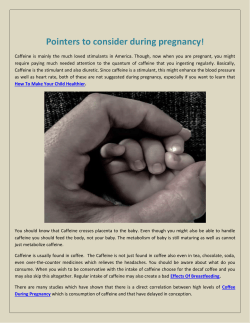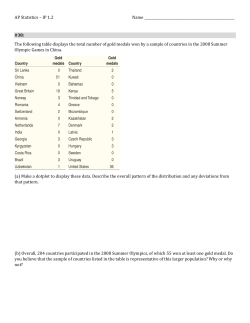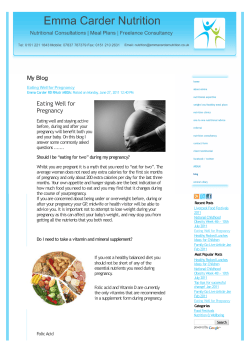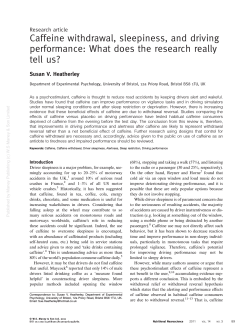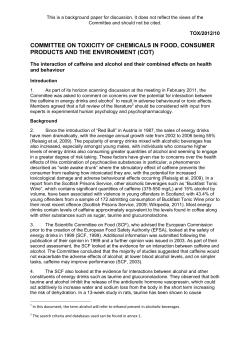
For more information about the Organization of Teratology Information (866) 626-6847 www.OTISpregnancy.org
For more information about the Organization of Teratology Information Specialists or to find a service in your area, call (866) 626-6847 or visit us online at: www.OTISpregnancy.org. Caffeine and Pregnancy This sheet talks about the risks that exposure to caffeine can have during pregnancy. With each pregnancy, all women have a 3% to 5% chance of having a baby with a birth defect. This information should not take the place of medical care and advice from your health care provider. What is caffeine? Caffeine is a stimulant found in many foods and beverages. It is also found in prescription and over the counter medications. Caffeine is a naturally occurring substance found in the leaves, seeds, and fruits of more than 60 plants. How much caffeine is in common foods and drinks? The amount of caffeine in some common items (amounts are approximate and may vary between products): 5oz. cup of coffee 40-180mg 5oz. brewed tea 20-90mg 12oz. Coke 46mg Red Bull energy drink 67mg 1 cup of coffee ice cream 58mg Hershey chocolate bar 10mg 8oz. hot chocolate 5mg 2 tablets of Excedrin 130mg Some herbals such as guarana also contain caffeine. What exactly does caffeine do to my body? Caffeine’s main effect is increased alertness. Within 1 hour of coffee consumption, caffeine usually reaches its peak level in the bloodstream and remains there for 4-6 hours. Caffeine also stimulates the release of acid in the stomach, sometimes resulting in an upset stomach. Caffeine is also a diuretic, which means it helps eliminate fluids from the body and can result in water and calcium loss. I am trying to become pregnant. Is it true that drinking caffeinated beverages will lower my chance to become pregnant? Results from studies have been mixed. Some studies have suggested that high levels of caffeine (more than 300mg/day) may make it harder to conceive, but these findings are not proven. Low to moderate caffeine consumption (less than 300mg/day) does not seem to reduce a woman’s chance of becoming pregnant. I am pregnant. Is it safe for me to continue drinking coffee and soda? Most experts agree that moderation and common sense are the keys for consuming caffeinated items during pregnancy. “Moderate” caffeine consumption is approximately 200-300mg/day, which is similar to 1-3 cups of coffee. It is also important for pregnant women to drink enough water, milk and juice. These fluids should not be replaced with caffeinated beverages. Does caffeine miscarriage? cause or contribute to Researchers have had difficulty determining whether there is a relationship between caffeine and miscarriage since miscarriage is very common. Most reports suggest that low to moderate consumption of caffeine does not increase the risk for miscarriage. A few studies have shown that there may be an increased risk for miscarriage or fetal death with high caffeine consumption (more than 200-300 mg/day), particularly in combination with smoking or alcohol, or with very high levels of caffeine consumption (more than 800 mg/day). Will drinking caffeinated beverages during my pregnancy cause birth defects in my baby? No. In humans, even large amounts of caffeine have not been shown to cause an increased chance for birth defects. lists caffeine as compatible with breastfeeding, consumption should be limited. The infant should also be watched for irritability and disturbances in sleep patterns Women should remain well hydrated with water, juice and milk while breastfeeding. April 2011. Copyright by OTIS. Reproduced by permission. Selected References: Bech BH, et al. 2005. Coffee and fetal death: a cohort study with prospective data. Am J Epidemiol 162(10):983-990. Brown ML, et al. 2006. Maternal exposure to caffeine and risk of congenital anomalies: a systematic review. Epidemiology 17(3): 324-331 Christian M and Brent R. 2001.Teratogen update: Evaluation of the reproductive and developmental risks of caffeine. Teratology 64: 51-78. Cnattingius S, et al. 2000. Caffeine intake and the risk of first-trimester spontaneous abortion. N Engl J Med 343:1839-1845. I drink 5-6 cups of coffee a day and I am 7 months pregnant. Will this amount of caffeine affect my baby? Committee on Drugs, 2001. American Academy of Pediatrics. The transfer of Drugs and Other Chemicals in Human Milk. Pediatrics 108(3): 776-789 Caffeine crosses the placenta. Therefore, large amounts of caffeine could affect babies in the same way as it does adults. Some reports have stated that children born to mothers who consumed more than 500mg/day were more likely to have faster heart rates, tremors, increased breathing rate, and spend more time awake in the days following birth. Hatch E and Bracken M. 1993. Association of delayed conception with caffeine consumption. Am J Epidemiol 138:1082-1091. Eskenazi B 1999. Caffeine—Filtering the facts. N Engl J Med 341:16881689. International Food Information Council Foundation. 1998. Everything you need to know about… caffeine. http://ificinofo.health.org. Klebanoff M, et al. 1999. Maternal serum paraxanthine, a caffeine metabolite, and the risk of spontaneous abortion. New Engl J Med 341:1639-1644. Larroque B, et al. 1993. Effects on birthweight of alcohol and caffeine consumption during pregnancy. Am J Epidemiol 137:941-950. Matijasevich A, et al. 2006. Maternal caffeine consumption and fetal death: a case-control study if Uruguay. Paediatr Perinat Epidemiol 20(2):100-109. Is it a problem if the baby’s father consumed a lot of caffeine when I became pregnant? Mills JL, et al. 1993 Moderate caffeine use and the risk of spontaneous abortion and intrauterine growth. JAMA 269:593-597. Savitz, DA, et al. 2008. Caffeine and miscarriage risk. Epidemiology 19(1):55-62. Very little information is available on the effects of caffeine on sperm. One report stated that caffeine seems to increase the motility (movement) of sperm. Currently there are no other known effects on pregnancy. Can I drink caffeinated beverages while I breastfeed? Caffeine passes into breast milk. Although the American Academy of Pediatrics Shu XO, et al. 1995. Maternal smoking, alcohol drinking, caffeine consumption and fetal growth: Results from a prospective study. Epidemiology 6:115-120. Weng, X, et al. 2008. Maternal caffeine consumption during pregnancy and the risk of miscarriage: a prospective cohort study. Am J Obstet Gynecol 279:e1-e8. If you have questions about the information on this fact sheet or other exposures during pregnancy, call OTIS at 1-866-626-6847.
© Copyright 2025
